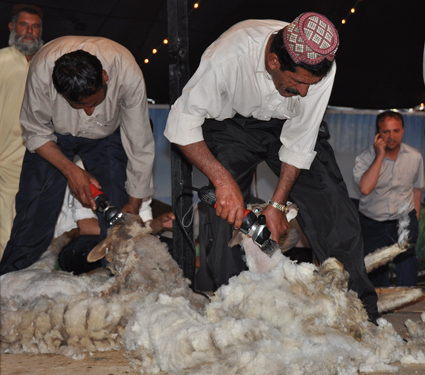Mechanical Shearing Changes Industry

The USAID-funded Balochistan Agricultural Project initiates transformation of the wool industry in Balochistan
Surrounded by irritated ‘Baas,’ a master shearer works slowly with his oversized scissors through the thick fleece of a sheep, while his two assistants keep the animal tied and pressed to the floor in a village outside Killa Saifulah, Balochistan Province of Pakistan. It takes 30-45 minutes to shear a sheep using this traditional method. The fleece comes out uneven, matted with the pieces of dirt, and has very little value in the market. More often than not, farmers give it away to the shearers for free.
Wool industry is an important source for incomes and jobs in rural Balochistan, which has an estimated 12 million sheep and earns US$5 million in annual revenues from wool clip. Yet outdated practices and lack of exposure to markets leave the huge potential of the industry untapped.
To increase incomes and employment opportunities, FAO, with funding from USAID, is helping Balochistan farmers to adopt modern wool-related practices, such as washing wool before shearing, classifying color-graded wool, grading fleeces, and producing even-length fiber through mechanical shearing. To help women earn more income the project trains women in activities women can do from their homes such as washing the fleece, sorting.
“I am so happy that new, much faster technologies are finally reaching my community, and the next generation of shearers can complete the job much faster,” says 56-year old Gulam Jan Khan who has spent most of his life earning living by shearing sheep. The mechanical shears which that the USAID-funded FAO project has introduced give sheep a much move even shave in less than 7 minutes, not only saving time but also improving revenues for the farmers and the shearers. “Now I can shear more than 50 sheep in one day all by myself. With scissors, I was able to shear only 10-12 sheep a day, and needed two assistants,” says one of the shearers.
The project worked with local firms to produce tractor-pulled mobile shearing shed with four shearing stations which can be operated by a team of seven men - 4 shearers, 2 roustabouts, and a maintenance mechanic, and can be moved from one sheep farm to another easily. The project has also developed a business model to support the adoption of this new technique.
“We are very pleased to buy wool from Balochistan shorn this way” says wool trader Malik Furrukh Nawaz from Galaxies Logistic International in Karachi. “The even length of the fleece that comes from this new technique and equipment means that we will be able to expand our export markets.” FAO estimates that these improved practices can increase the revenues of the Balochistan wool industry up to US$20 million a year.
